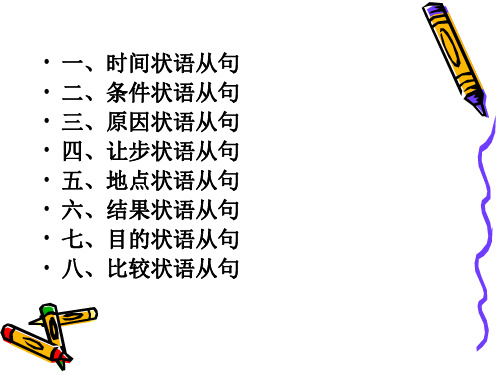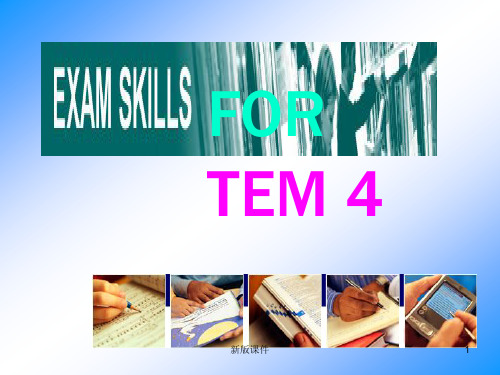英语四级语法讲解.ppt
合集下载
最新[英语考试]英语专业四级考试 语法词汇知识幻灯片课件
![最新[英语考试]英语专业四级考试 语法词汇知识幻灯片课件](https://img.taocdn.com/s3/m/4b246e063186bceb18e8bbb7.png)
C. is not long distance
D. are not long distances 6. 与冠词的搭配
___ London of Dicken’s time come to ___ in his books.
A. The, / B. /,/ C. /, the D. The,the
代词
The city council ___ meeting to discuss the point. A. is B. are C. was D. were ❖ 4) a committee,etc. of + 如果主语是由“a committee of /a panel of /a board of +复数名词”构成,随后的动词通常用
❖ 3.具体考查重点为以上项目中的特殊用法,不 常用的情况
❖ 2.习惯用法如:confess to/set about/be used to+doing; be supposed to/have/ make sb.+do
❖ 3.由同一动词构成的短语如:come,go,set, break,put
It takes ___ to build a road
A. a lot of machine B. a lot of machinery
C. much machines D. much machineries ❖ 3)既可作单数也可作复数的集体名词如: audience,
committee, class, crew, family, public, government
A. / B. that of C. which is D. of
❖ 5. 表示时间、距离、金额、重量、面积、体积、 容积等度量的名词短语做主语时,谓语用单数。 Ten miles ____ in such a large city.
D. are not long distances 6. 与冠词的搭配
___ London of Dicken’s time come to ___ in his books.
A. The, / B. /,/ C. /, the D. The,the
代词
The city council ___ meeting to discuss the point. A. is B. are C. was D. were ❖ 4) a committee,etc. of + 如果主语是由“a committee of /a panel of /a board of +复数名词”构成,随后的动词通常用
❖ 3.具体考查重点为以上项目中的特殊用法,不 常用的情况
❖ 2.习惯用法如:confess to/set about/be used to+doing; be supposed to/have/ make sb.+do
❖ 3.由同一动词构成的短语如:come,go,set, break,put
It takes ___ to build a road
A. a lot of machine B. a lot of machinery
C. much machines D. much machineries ❖ 3)既可作单数也可作复数的集体名词如: audience,
committee, class, crew, family, public, government
A. / B. that of C. which is D. of
❖ 5. 表示时间、距离、金额、重量、面积、体积、 容积等度量的名词短语做主语时,谓语用单数。 Ten miles ____ in such a large city.
大学英语四级考试辅导语法课件-PPT精选文档308页

--How nice it would be if you could stay a bit longer! 如果你能久留些日子,那多好啊!
--If I knew his address ,I would be able to write to him . 如果我知道他的地址,我就能给他写信了。
1.2.虚拟语气用于宾语从句
1.2.1.句型“…wish that…”
在wish后的that宾语从句中: 1.如果表示对现在的愿望,从句谓语要使用过去
时: (1)从句谓语动词如果是be,则用were形式。 (2)从句谓语动词如果是行为动词,则用过去
时形式。 --I wish I were a bird. 但愿我是只鸟儿。 --I wish you didn’t talk like that.
1.2.2. 句型“主语+引起虚拟的 动词+含虚拟语气的宾语从句”
1.英语中有很多表示愿望、请求、命令、 建议等意义的动词,当它们作为谓语引 导宾语从句时,从句谓语必须用 “(should)+动词原形”的形式.常用的 这类动词有:
demand,insist,suggest,command, request,order,propose,desire,require, urge,maintain,deserve,recommend, intend,move,ask,prefer,advise,decide等 等。
3.如果表示对过去没有实现或不可能实现的 愿望,从句谓语动词用过去完成时形式 “had+done/been ”形式。
--I wish you hadn’t made so many spelling mistakes in the last exam. 但愿上次考试你没出那么多拼写错误。
四级班PPT语法

后接动名词的动词和短语
admit, anticipate, appreciate, avoid, deny enjoy, escape, delay, consider, excuse, fancy imagine, finish, keep, mind, mention, postpone, practice, prevent , propose, quit, resent, risk, resist, permit, recommend, acknowledge, require, favor, reject, involve, imply, guarantee, confirm, justify, approve, ban, prohibit, hinder, omit, overlook, predict cannot help, give up, put off, be used to, be accustomed to, dedicate to, confess to, confine to , contribute to, object to, resort to, yield to , appeal to , look forward to, approve of, devote to, be ashamed of, oppose to, admit to, accuse…of…
3.复合结构:
I would appreciate your keeping it a secret. Mr. Li insisted our having lunch with them. Mr. Li insisted having lunch with them. 4. 几个特殊结构 have difficult/ trouble/ a good time (in) doing sth. Lose no time (in) doing sth. There is no point/ use/good / point / fun/ sense (in) doing sth.
CET英语四级句型与语法总结资料(PPT课件)ModelVerb

at h表示必须和需要:must, have to, need
• 1)must表示说话人认为“必须”;否定回答时 用needn’t “不必”。
• You must be here at nine o’clock. • Must you go soon? No, I needn’t go yet. • 2) have to 表示他人或客观情况要求“必须”。 • I have to be back at school by eight. I have
• Put that cigarette out. You must not smoke near a petrol pump!
• 3) 表示过去“许可”不用could,might,要用其他表达方式。 • We had been/were given permission to speak to the patient. • 但在间接引语中表达过去“许可”,可用could,might。 • T2h021e/8/5nurse said that we could/might speak to the patient for
• You can go at four o’clock.
• Could I borrow your pen?
• Students may take 3 books each.
• Might I ask whether you are using the typewriter? • 2) 表示“不允许”用 can’t, may not, mustn’t; must not 语气重。 • You can’t leave the table unless you finish your meal.
2021/8/5
• 1)must表示说话人认为“必须”;否定回答时 用needn’t “不必”。
• You must be here at nine o’clock. • Must you go soon? No, I needn’t go yet. • 2) have to 表示他人或客观情况要求“必须”。 • I have to be back at school by eight. I have
• Put that cigarette out. You must not smoke near a petrol pump!
• 3) 表示过去“许可”不用could,might,要用其他表达方式。 • We had been/were given permission to speak to the patient. • 但在间接引语中表达过去“许可”,可用could,might。 • T2h021e/8/5nurse said that we could/might speak to the patient for
• You can go at four o’clock.
• Could I borrow your pen?
• Students may take 3 books each.
• Might I ask whether you are using the typewriter? • 2) 表示“不允许”用 can’t, may not, mustn’t; must not 语气重。 • You can’t leave the table unless you finish your meal.
2021/8/5
英语专业四级语法TEM4语法讲座省公开课金奖全国赛课一等奖微课获奖PPT课件

• 2.习惯使用方法如:confess to/set about/be used to+doing; be supposed to/have/make sb.+do
• 3.由同一动词组成短语如:come,go,set,break • 4.单个动词,抽象名词,形容词和副词多以近义词、同义词形式出
• 5.介词短语在句中作状语如:in terms of;with the exception of; in vain等,另外还应注意rather than,other than,such as,none /nothing+but
16/125
A.2 识别记忆同音异形异义词
• bear(熊)———bare (裸露), been (be过去式)———bean(蚕豆), • meet———meat, blew (blow过去式)———blue, cellar—seller, • higher———hire (雇用), write———right ,bread———bred (breed
• 2、表示否定意义前缀 (1)纯否定意义前缀有in-,dis-,non-,un-等,表示“无,非,不”之意, informal(非正式),dishonest(不老实),non-effective(无效 力),uncomfortable.(不舒适)等。 (2)表示错误意义前缀有mis-,(误,恶),mal-(坏)等 mis-understand (误解),malediction(诽谤)等。 (3)表示相反动作前缀有dis-(否定,相反),de-(离开,除去),un-(不,无)等,
过去式), • dear———deer(鹿), fined (fine过去式)———find, • flour(面粉)———flower , hall———haul(拖,曳), fir(冷却)———
• 3.由同一动词组成短语如:come,go,set,break • 4.单个动词,抽象名词,形容词和副词多以近义词、同义词形式出
• 5.介词短语在句中作状语如:in terms of;with the exception of; in vain等,另外还应注意rather than,other than,such as,none /nothing+but
16/125
A.2 识别记忆同音异形异义词
• bear(熊)———bare (裸露), been (be过去式)———bean(蚕豆), • meet———meat, blew (blow过去式)———blue, cellar—seller, • higher———hire (雇用), write———right ,bread———bred (breed
• 2、表示否定意义前缀 (1)纯否定意义前缀有in-,dis-,non-,un-等,表示“无,非,不”之意, informal(非正式),dishonest(不老实),non-effective(无效 力),uncomfortable.(不舒适)等。 (2)表示错误意义前缀有mis-,(误,恶),mal-(坏)等 mis-understand (误解),malediction(诽谤)等。 (3)表示相反动作前缀有dis-(否定,相反),de-(离开,除去),un-(不,无)等,
过去式), • dear———deer(鹿), fined (fine过去式)———find, • flour(面粉)———flower , hall———haul(拖,曳), fir(冷却)———
专四语法考点串讲状语从句ppt课件

• 考点四:no matter +疑问词相当于疑 问词+ever: 不管…都…
五、地点状语从句
• where/ wherever (wherever --- 无论哪 里)
• 考点聚焦:地点状语从句和where定语从句的 区别:
• Tips: 判断是定语从句还是地点状语从句,要 看从句前是否有先行词,有先行词的是定语从 句,否则是状语从句。
• (6)It was not + 时间段 + before从句“没过多 长时间就……”
二、条件状语从句
• 连接词:if , unless( 如果..不,除非), so/as long as(只要), on condition that(条件是),as (so) far as ( 据.. 所知), provided that(要是,如果), in case(万一,假使),等
• 考点二:while 尽管
• eg. While I have sympathy for you, I can’t help you.
• 考点三:Whether ---不管,常与or not 连用
• Eg. Whether he is good or not, the company decided to send him abroad.
• Since everyone makes mistakes in life, you needn’t scold him for it.
• The day breaks, for the birds are singing.
• 考点二、 when 既然
• Eg. How can you expect to learn anything when you never listen?
五、地点状语从句
• where/ wherever (wherever --- 无论哪 里)
• 考点聚焦:地点状语从句和where定语从句的 区别:
• Tips: 判断是定语从句还是地点状语从句,要 看从句前是否有先行词,有先行词的是定语从 句,否则是状语从句。
• (6)It was not + 时间段 + before从句“没过多 长时间就……”
二、条件状语从句
• 连接词:if , unless( 如果..不,除非), so/as long as(只要), on condition that(条件是),as (so) far as ( 据.. 所知), provided that(要是,如果), in case(万一,假使),等
• 考点二:while 尽管
• eg. While I have sympathy for you, I can’t help you.
• 考点三:Whether ---不管,常与or not 连用
• Eg. Whether he is good or not, the company decided to send him abroad.
• Since everyone makes mistakes in life, you needn’t scold him for it.
• The day breaks, for the birds are singing.
• 考点二、 when 既然
• Eg. How can you expect to learn anything when you never listen?
(英语专业四级语法(考点)全版.ppt

• It is essential that all these figures be checked twice.
新版课件
25
真题举例:
1.It is absolutely essential that William continue his study in spite of some learning difficulties.(07,65)
John is less bright than Bob.
新版课件
5
用法: 1.主语不同,比较项目相同。
This parcel is as heavy as that one. 2. 主语相同,比较项目不同。 The girl was as brilliant as she was beautiful.
The present crisis is much more a political than an economic crisis.
当前的危机与其说是经济危机,不如说是政治危机
此用法也可用于less…than…结构,但得出相反的 含义。
The present crisis is much less a political than
新版课件
13
3.no more …than (=not…any more than) 两者一样都不
A whale is no more a fish than a horse is.
鲸不是鱼,如同马不是鱼一样。
Fat cannot change into muscle any more than muscle changes into fat.(99.44)
should do / were to do
17
新版课件
25
真题举例:
1.It is absolutely essential that William continue his study in spite of some learning difficulties.(07,65)
John is less bright than Bob.
新版课件
5
用法: 1.主语不同,比较项目相同。
This parcel is as heavy as that one. 2. 主语相同,比较项目不同。 The girl was as brilliant as she was beautiful.
The present crisis is much more a political than an economic crisis.
当前的危机与其说是经济危机,不如说是政治危机
此用法也可用于less…than…结构,但得出相反的 含义。
The present crisis is much less a political than
新版课件
13
3.no more …than (=not…any more than) 两者一样都不
A whale is no more a fish than a horse is.
鲸不是鱼,如同马不是鱼一样。
Fat cannot change into muscle any more than muscle changes into fat.(99.44)
should do / were to do
17
2024年度最新全国大学四级考试讲座ppt精品课件

2024/3/24
真题解析
分析历年真题,了解考点和出题规律, 总结答题技巧。
持续练习
保持每天一定的听力练习量,持续提高 听力水平。
11
03
阅读理解部分备考策略与 技巧
2024/3/24
12
阅读理解题型分析及解题步骤
01
题型概述:阅读理解部分主要包括主旨大意题、细节理解 题、推理判断题和词汇理解题等四种题型。
21
写作技巧指导
审题立意
认真审题,明确写作主题和要求, 确定文章立意。
谋篇布局
合理安排文章结构,包括开头、正 文和结尾三部分。
2024/3/24
选词造句
选用恰当的词汇和句型,注意语言 的准确性和丰富性。
检查修改
检查文章是否符合要求,修改语法 错误和拼写错误。
22
模拟题训练及真题解析
模拟题训练
通过模拟题训练,熟悉考试题型和难度,提高解题速度和准确性。
2024/3/24
02
选择与真题难度相当的模拟题进行训练。
严格按照考试时间和要求完成模拟题。
03
17
模拟题训练及真题解析
• 认真核对答案,分析错题原因,总结经验教训。
2024/3/24
18
模拟题训练及真题解析
真题解析 分析文章结构、题型特点和解题技巧。
2024/3/24
选择历年真题进行解析。 总结真题规律和趋势,为备考提供指导 。
最新全国大学四级考试讲座 ppt精品课件
2024/3/24
1
目录
• 考试概述与重要性 • 听力部分备考策略与技巧 • 阅读理解部分备考策略与技巧 • 翻译和写作部分备考策略与技巧
2024/3/24
真题解析
分析历年真题,了解考点和出题规律, 总结答题技巧。
持续练习
保持每天一定的听力练习量,持续提高 听力水平。
11
03
阅读理解部分备考策略与 技巧
2024/3/24
12
阅读理解题型分析及解题步骤
01
题型概述:阅读理解部分主要包括主旨大意题、细节理解 题、推理判断题和词汇理解题等四种题型。
21
写作技巧指导
审题立意
认真审题,明确写作主题和要求, 确定文章立意。
谋篇布局
合理安排文章结构,包括开头、正 文和结尾三部分。
2024/3/24
选词造句
选用恰当的词汇和句型,注意语言 的准确性和丰富性。
检查修改
检查文章是否符合要求,修改语法 错误和拼写错误。
22
模拟题训练及真题解析
模拟题训练
通过模拟题训练,熟悉考试题型和难度,提高解题速度和准确性。
2024/3/24
02
选择与真题难度相当的模拟题进行训练。
严格按照考试时间和要求完成模拟题。
03
17
模拟题训练及真题解析
• 认真核对答案,分析错题原因,总结经验教训。
2024/3/24
18
模拟题训练及真题解析
真题解析 分析文章结构、题型特点和解题技巧。
2024/3/24
选择历年真题进行解析。 总结真题规律和趋势,为备考提供指导 。
最新全国大学四级考试讲座 ppt精品课件
2024/3/24
1
目录
• 考试概述与重要性 • 听力部分备考策略与技巧 • 阅读理解部分备考策略与技巧 • 翻译和写作部分备考策略与技巧
2024/3/24
- 1、下载文档前请自行甄别文档内容的完整性,平台不提供额外的编辑、内容补充、找答案等附加服务。
- 2、"仅部分预览"的文档,不可在线预览部分如存在完整性等问题,可反馈申请退款(可完整预览的文档不适用该条件!)。
- 3、如文档侵犯您的权益,请联系客服反馈,我们会尽快为您处理(人工客服工作时间:9:00-18:30)。
*从句类型的判定:
看从句在整个句子中处在什么位 置上、作什么句子成分。
通常位于句子开头的从句是主语 从句;动词后面的从句是宾语从 句;系动词后面的从句是表语从 句;名词后面的从句只能是同位 语从句或定语从句引导词
从属连词: that, whether 连接代词:
② Beer is the most popular drink among male drinkers, __A__ overall consumption is significantly higher than that of women.
A whose B which
C that
D what
A which B what
C that
D one
☆宾语从句引导词: 属连词: that, whether, if 连接代词:
what, which, who, whom
(词尾加-ever加强语气)
连接副词: when, where, why, how
☆表语从句引导词: 从属连词: that, whether, if 连接代词:
As is well known, Rome is not built in a day.
As we all know, Rome is not built in a day.
① This is the city _B__. A I like to visit it most B I like to visit most C I most like to visit D I most like to visit it
who, whom: 先行词为人, 在句中可作主语、宾语;
whose: 先行词为人、事、物, 在句中作定语;
as:
①先行词被 the same, such修饰 或先行词本身就是 the same, such;
②引导非限定性定语从句, 代替整 个句子, 在从句中作主语或宾语.
It wasn’t such a good dinner as she had promised us.
关系代词: who, whom, whose that, which, as ☆
关系副词: when, where, why = 介词+关系代词 ☆
1 定语从句引导词在句中 起三个作用: ①引导和连接主、从句 ②在从句中作某种成分 ③替代先行词
(因此从句中不能再有先行词或其 代词)
that, which: 先行词为事、物, 在句中可作主语、宾语;
what, which, who, whom 连接副词:
when, where, why, how
The question is whether we shall stay or not. / how we can get there. / whom he is looking for. / who he is.
The reason is (that) he is ill. That’s what they did. / why I
didn’t come.
☆同位语从句引导词: 从属连词: that, whether 连接副词:
when, where, why, how that: 无意义,不做成分,但不能
③ The hours __C__ the children
spend in their one-way relationship with TV people undoubtedly affect their relationships with real-life people.
1 of Time (时间) 2 of Place(地点) 3 of Cause(原因) 4 of Result(结果) 5 of Purpose(目的) 6of Condition(条件) 7 of Concession(让步) 8 of Manner(方式) 9 of Comparison(比较‘) 10 of Analogy(类比)
表语从句 — Predicative Clause
同位语从句—Appositive Clause
形容词性从句
Attributive Clause
定语从句
Restrictive ~ 限制性定语从句
Non-restrictive ~ 非限制性定语从句
副词性从句 Adverbial Clause状语从句
There was the question where we were to go. / what we were to do. / when we were to start. / how we could get there. / why we should help them.
☆定语从句引导词:
从句
从
句
根据英语从句在句子中的作 用,从句可分为三类:
❖名词性从句 Nominal Clauses
❖形容词性从句 Adjectival Clauses
❖副词性从句 Adverbial Clauses
名词性从句
Including: 主语从句 — Subject Clause 宾语从句 — Object Clause
what, which, who, whom 连接副词:
when, where, why, how
1 That he is always ready to help others is known to all.
2 In some countries, __B__ is called “equality” doesn’t really mean equal right for equal people.
省略.
*同位语从句所修饰的名词被称为 先行词. 常见先行词有:
idea, fact, news, hope, belief,
thought, doubt, question,
sign, suspect, …
以及表示“建议、命令、请求” 的词 (后者句中要用虚拟语气).
The question whether it is right or wrong depends on the results.
